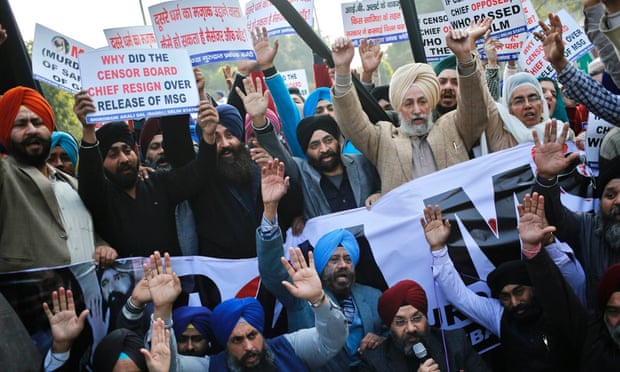Spotlight falls on political sympathies of replacement for censor board chief who resigned after ban on MSG: The Messenger of God was revoked by appeals board
India’s film censorship organisation is in crisis after the resignation of its chair, Leela Samson, amid complaints of “interference, coercion and corruption”, and more than half its board members.
On Monday, the Bollywood director Pahlaj Nihalani was appointed in Samson’s place. However, Nihalani’s connections with India’s ruling Bharatiya Janata party (BJP) – and those of the replacements for other members of the Central Board of Film Certification (CBFC) who walked out in solidarity with Samson – have aroused considerable concern.
The controversy erupted last week after the CBFC refused to allow the release of MSG: The Messenger of God only to be overruled by a higher body tasked with settling disputes, the Film Certification Appellate Tribunal (FCAT).
MSG stars a real-life spiritual leader, Gurmeet Ram Rahim Singh, playing himself while tackling drug addiction and curing deadly illnesses. Singh is the head of a controversial religious organisation, Dera Sacha Sauda (DSS), based in the north Indian state of Haryana.
The board accused MSG of being a feature-length advertorial for Singh and DSS. A member of the revising committee told the digital news outlet Scroll, on condition of anonymity, that the film promotes “blind faith” and “has the potential to create conflict”.
Singh has been a contentious figure for years, causing riots in Punjab in 1997 after he appeared in advertisements dressed up as Guru Gobind Singh, one of Sikhism’s holiest figures. A number of Sikh organisations, including the Akal Takht, Sikhism’s highest temporal body, had sought a ban on MSG’s release, originally slated for 16 January. Finding its portrayal of Singh blasphemous, they staged protests against the film.
What rankled Samson and her colleagues was that it took the FCAT only three days to overturn the CBFC’s decision. “It usually takes a month to get a tribunal to hear a case,” former board member Nandini Sardesai told Scroll. “How can you constitute a tribunal overnight?”
Samson has faced external pressure in the past, most recently last month when the CBFC refused a government demand to trim scenes from PK, a Bollywood send-up of organised religion and self-styled gurus. “There was total interference on every film, big and small,” she told Hindustan Times after resigning. “A lot of pressure was put on the film PK … to cut scenes.”On discovering the FCAT ruling, Samson sent an email to her colleagues claiming the chain of events had made a “mockery” of them. She hoped they would resign “en masse”.
Rajyavardhan Singh Rathore, minister for information and broadcasting, denied government interference and said the CBFC has been kept at arm’s length. “We as the government would like to see that SMS, or a letter where [Samson] or any other member has been coerced,” he said.“Then we would take appropriate action.”
Samson resigned on 15 January, with 12 other board members quitting soon afterwards. In a letter to the ministry, they termed the recent events “the proverbial last straw”.
The composition of the new board — especially the number of BJP sympathisers on it — does little to allay the accusations made by Samson and her co-workers. In the runup to last year’s general elections, Nihalani directed a music video praising the current prime minister, Narendra Modi. During a television interview on Tuesday, he said he was proud to be a “BJP person”, and called Modi his “action hero” and “the voice of the nation”. He blames the previous government, saying “the [board’s] problems” started during their tenure.
Three other new members are either BJP leaders or have ties to its nationalist parent organisation, the Rashtriya Swayamsevak Sangh. One of them even contested the 2014 general elections on a BJP ticket.
MSG is now slated for release on 6 February. The chief minister of Punjab, whose state had earlier banned the film due to the communiqué regarding public safety concerns, has said the government will “review the order.”. Nihalani says his plan is to restore the CBFC’s “battered image”.


No comments:
Post a Comment